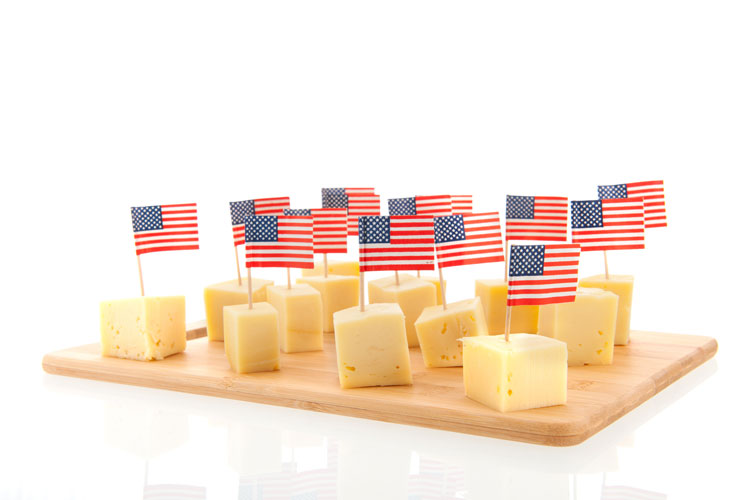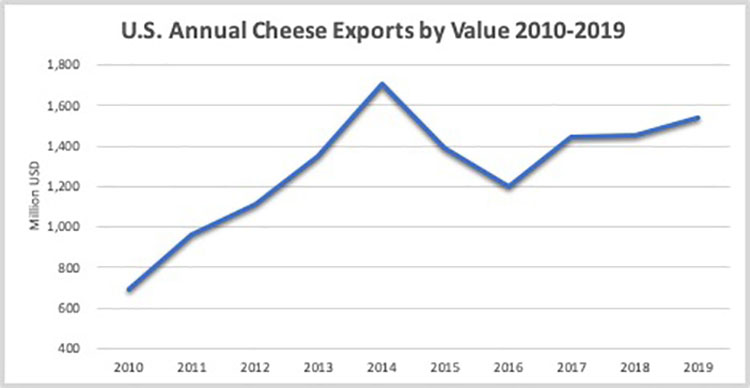
There’s something funky in the air, and it’s not America’s award-winning cheeses.
The European Union (EU) is waging a multi-front campaign against American-made cheeses, putting U.S. dairy jobs at risk and harming the rural communities that depend on dairy. The National Milk Producers Federation (NMPF) has been on the offense to protect common name cheeses and safeguard U.S. market access in key countries.
Instead of choosing to compete with high-quality U.S. cheeses on a level playing field, the EU raises unfair trade barriers. The EU has confiscated common cheese names by using trade agreements and negotiations with countries around the world to block U.S. exports. Dozens of common cheese names are at risk, including Parmesan, Asiago, Feta, Havarti, and Gruyère.
Alarmingly, the EU wants to ban U.S. producers from using these names even in our domestic market.
U.S. cheese exports have more than doubled over the last 10 years and now account for more than $1.5 billion in U.S. export sales. Any additional roadblocks in the form of restrictions on common names would dull what has been a bright spot for our industry during a tough few years.
A potential downturn in sales
If the EU were successful in its attempts to force U.S. producers to name Gruyère simply “alpine cheese” or call Parmesan “aged cheese,” studies show that confused consumers would choose other products, leading to nearly $72 billion in lost farm revenue over 10 years and putting more than 220,000 jobs across the dairy supply chain at risk.
This is an issue that everyone in dairy should be paying attention to — even those who don’t produce cheeses under threat. U.S. and EU policies are at a crossroads on many trade provisions related to dairy and animal proteins. If the EU is allowed to take an inch by dictating global policy on common names, they will quickly take a mile and force unscientific regulations and other unfair trade demands on U.S. producers. We must fight to maintain the principles of fair trade and ensure that future market access opportunities are preserved.

That’s why NMPF has been working alongside the Consortium for Common Food Names and the U.S. Dairy Export Council to raise this issue to an unprecedented level of importance among policymakers.
These efforts have secured important wins in the fight for common names. A total of 61 senators recently sent a letter to the U.S. Trade Representative (USTR) and the U.S. Department of Agriculture requesting that the U.S. government enhance their common food name protections as a core policy objective in all trade-related discussions. Members of the House of Representatives are also eager to send a similar message to USTR and USDA this fall.
Full steam ahead
Europe has demonstrated it will not yield in its destructive agenda. These messages are a critical step toward advancing a consistent policy on common names.
The head of USTR, Ambassador Robert Lighthizer, also made explicit note of the EU’s anti-trade GI campaign in a recent op-ed in The Wall Street Journal, writing, “The EU uses its trade deals in many cases not to advance trade liberalization, but to force other countries to adopt thinly veiled protectionist measures like ‘geographic indications,’ which prohibit the use of common labeling terms for wine and food items produced outside the EU.”
Protecting common name cheeses is about more than a name. It’s about preserving multigenerational family businesses that have been producing cheese in America for decades. It’s about expanding economic opportunities for dairy farmers and the rural communities they support. It’s about offering consumers the choice to purchase the cheeses they know and love.
Protecting common cheese names means protecting U.S. dairy jobs. We’re proud to fight for you.









